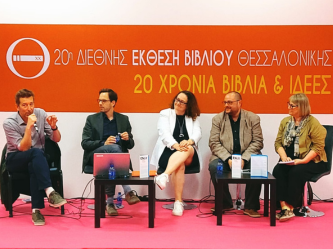No place like home?
Three times a year, Paul Hermans, director of Flanders Literature, writes a column in which he emphasizes the beauty and the challenges of the literary field. We also translated his sixth column into English, because he discusses the importance of translating European literature, sparked by his recent visit to the International Book Fair in Thessaloniki for the biennial meeting of the European Network for Literary Translation (ENLIT).

Late last year ‘The Economist’ asked 1,500 Americans about their reading habits, in order to chart the number of books that are read in a human lifetime. On average, readers read eleven books a year. In my case it will be a little more, from a to z perhaps around forty. In Belgium the average man lives to the age of 79.5. That means I’ve got only another 1,380 books to read, just 0.00086% of the total on offer. Depressing – and choice overload is a source of stress. Which book will be my next chosen one?
Now I have a book plan for the summer. And it’s actually quite specific. I’m going to read translations. I'll begin with European titles from smaller languages translated into Dutch. Gospodinov (Bulgarian)! Zabushko (Ukrainian)! Cartarescu (Romanian)! Salvioni (Italian)!
European identity and the role of literature. Gulp.
So am I tired of Flemish literature? Not at all, but it’s practically all that I’ve read over the past few years. A good many gems shine out of the Flemish books basket, ready to conquer a larger readership with a translation. When the Netherlands and Flanders were guests of honour at the Leipzig Book Fair last March, they indeed managed quite a successful conquest. If there are gems here, then our European colleagues must have some as well. Two weeks ago I could no longer ignore them. It happened like this.
I was at the International Book Fair in Thessaloniki for the biennial meeting of the European Network for Literary Translation (ENLIT), of which Flanders Literature is a member. The network is made up of 29 organizations from 26 countries and regions. Most members of the ENLIT network invest, as we do, in support programmes for translations, to make their literature more visible to an international readership. Along with four colleagues, from Wales, Ireland, Slovakia and Bulgaria, I discovered on arrival the evening before that we were announced in the programme as due to speak in a debate about European identity and the role of literature. Gulp. I envied several others who’d been given the opportunity to speak about the effects of support for translations. That was a subject more familiar to me.
But I refused to be daunted. In my hotel room that night I ploughed through an apparently endless series of essays and academic texts about European literature, in search of a common theme that would help me to organize my thoughts. Unhindered by any advanced schooling in literature, I became fascinated by the countless contradictions.
Is there such a thing as a European identity united in a literary system, a series of shared characteristics that define a group of writers or works?
Is it possible to compile a canon of European literature? Sure, you can set off from Homer and go all the way to Houellebecq, but from the very start the boundaries of Europe are vague and variable, and there is considerable cross-fertilization with areas beyond, through migration (de)colonization, the internet and so forth. These days everything is connected to everything else, but even 2,000 and more years ago, the myth arose of Europa, who as a Phoenician (now Lebanese) princess was abducted by Zeus and taken to Crete, as the result of a mutual fascination between west and east, between Greece and Asia.
The large number of authors who have actually travelled through Europe and beyond over past centuries proves that literature and its readers pay no heed to national borders. If there is such a thing as European literature today, beyond the sum of its parts, then it does not represent an identity or a territory but a dynamic polyphony, characterized by interaction between languages and cultures, and by the mediation between them that gives expression to the perspective of the other. The latter is epitomized by the translator, or ‘the literary bridge-builder of the European soul’, as Alicja Gescinska recently put it so aptly in the fifth State of European Literature lecture.
Reciprocity
So there I was, having read as much as I could in preparation for the debate. And we all played the translation card. Logical. All of us focus on promoting our ‘national’ literature, but that’s really only half the story. Reciprocity is often lacking. The export strategy, by which national governmental support promotes a country’s books abroad, needs to be coupled with an import strategy, such that extra money is reserved to make incoming translations possible, and to facilitate and encourage the reading of literature from abroad. That’s the way to achieve reciprocity.
It is precisely this two-way traffic that’s cited in the European report on the multifaceted issues of the translation sector and how government funding can contribute to the circulation of books in translation.
Lastly, during the debate we were asked to place a few titles in the limelight. A conversation that we continued between ourselves until deep into the night. Now I’m going to convert the curiosity I acquired into carefully considered book choices. I’ll start with Gospodinov’s ‘Time Shelter’, an ironic parable about the march of populism in Europe. любопитно!